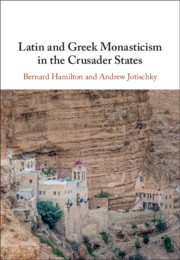Book contents
- Latin and Greek Monasticism in the Crusader States
- Latin and Greek Monasticism in the Crusader States
- Copyright page
- Contents
- Figures
- Abbreviations
- Acknowledgements
- Maps
- Introduction
- Part I Latin Monasticism
- 1 The Latin Presence in the Levant before 1097
- 2 The Austin Canons
- 3 The Premonstratensian Canons
- 4 The Canons Regular of St Ruf, Avignon, in the County of Tripoli
- 5 Benedictine Monasteries
- 6 Benedictine Convents
- 7 Benedictine Monasteries in the Tradition of St Romuald and St Peter Damian
- 8 The Cistercians
- 9 The Carmelites
- 10 The Franciscan Provincia Terrae Sanctae
- 11 The Dominican Provincia Terrae Sanctae
- 12 Antiochene Monasteries of Uncertain Rite
- Part II Greek Orthodox Monasticism
- Select Bibliography
- Index
2 - The Austin Canons
from Part I - Latin Monasticism
Published online by Cambridge University Press: 08 October 2020
- Latin and Greek Monasticism in the Crusader States
- Latin and Greek Monasticism in the Crusader States
- Copyright page
- Contents
- Figures
- Abbreviations
- Acknowledgements
- Maps
- Introduction
- Part I Latin Monasticism
- 1 The Latin Presence in the Levant before 1097
- 2 The Austin Canons
- 3 The Premonstratensian Canons
- 4 The Canons Regular of St Ruf, Avignon, in the County of Tripoli
- 5 Benedictine Monasteries
- 6 Benedictine Convents
- 7 Benedictine Monasteries in the Tradition of St Romuald and St Peter Damian
- 8 The Cistercians
- 9 The Carmelites
- 10 The Franciscan Provincia Terrae Sanctae
- 11 The Dominican Provincia Terrae Sanctae
- 12 Antiochene Monasteries of Uncertain Rite
- Part II Greek Orthodox Monasticism
- Select Bibliography
- Index
Summary
After the First Crusade, which resulted in the conquest of Jerusalem, the shrines in the Holy Land fell into the hands of the western Latin crusaders. Most of them, especially those located in large cathedral churches, were given by the Latin authorities to new foundations of Latin canons following the Rule of Augustine, which was the norm for cathedrals in the West. This chapter examines in turn the major communities of Augustinian canons, beginning with the most important shrine, the Holy Sepulchre, and also considering the Templum Domini, Mt Zion, the Mount of Olives, Bethlehem, Nazareth and others. The circumstances of foundation, the manner in which the communities were governed and the important role they played as major landowners in the Crusader States provide the main approach to the chapter.
Keywords
Information
- Type
- Chapter
- Information
- Latin and Greek Monasticism in the Crusader States , pp. 22 - 149Publisher: Cambridge University PressPrint publication year: 2020
